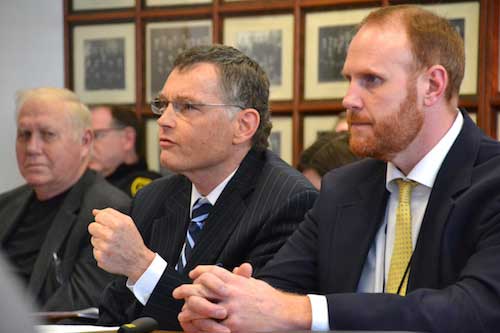County opposes push to legalize recreational marijuana
‘We don’t need more intoxicants in society.’ – Dr. Tom Madejski, president of the Medical Society of the State of New York

Photo by Tom Rivers: Dr. Tom Madejski of Albion (left), who is president of the Medical Society of the State of New York, joins Paul Pettit, the Public Health director for the Health Departments in Genesee and Orleans counties, and sharing their concerns about legalizing recreational marijuana in the state. Pettit is also president of the New York State Association of County Health Officials. The two are speaking at Wednesday’s meeting of the Orleans County Legislature.
ALBION – The Orleans County Legislature went on the record Wednesday in asking the state to hold off on legalizing recreational marijuana, saying there are many negative impacts to society, as well as financial hits to local governments if marijuana gets the state’s blessing.
Two local health officials, who lead state-wide organizations, also said there are too many unknowns for New York to allow legalized recreational marijuana.
There will be impacts with more impaired drivers, likely leading to more serious motor vehicle accidents, Orleans County legislators were told on Wednesday by Dr. Tom Madejski and Paul Pettit. Madejski of Albion is president of the Medical Society of the State of New York. Pettit is the Public Health director for the Health Departments in Genesee and Orleans counties. He also leads the NYS Association of County Health Officials.
They said legalizing marijuana will likely lead to more use among teen-agers and young adults, and that use at a young age makes them far more likely to develop drug addictions, the two said.
“If this goes badly we’ll damage another segment of society,” Madejski told county legislators.
He has helped lead the Medical Society of the State of New York’s response to the opioid epidemic, which Madejski said started about 20 years ago when opioids were pushed for pain relief, only to become highly addictive for many people.
He said legalizing recreational marijuana is “bad social policy.”
“We don’t need more intoxicants in society,” he said.
Gov. Andrew Cuomo and the State Legislature have been debating legalizing recreational marijuana.
County Legislator Don Allport, R-Gaines, said the push for legalization is a money grab by the state, which wants to tax marijuana sales.
Proponents of legalizing recreational marijuana say it will take marijuana out of the black market. However, Madejski and Pettit said the black maret will continue to thrive because marijuana will be available without a big tax likely to be imposed by the state, making it more expensive.
Pettit said the state needs to fund a public education plan about the dangers of marijuana use, if it is legalized for recreational use. He worries that children will be exposed through second-hand smoke or through edible marijuana that may be left around a house and appear to be candy or cookies.
Pettit said today’s marijuana is highly potent. “These aren’t your grandma’s brownies,” he said.
Several organizations are opposing recreational marijuana in New York include the Medical Society of New York, NYS Parent Teachers Association, NYS Sheriffs’ Association, NYS Association of Alcoholism and Substance Abuse Providers, Association of School Business Officials, and Smart Approaches to Marijuana.
Pettit presented a slide show to county legislators on Wednesday. He shared the following:
• Some of the ways of using marijuana include combusted products (joints, pipes, bongs, bowls, blunts and splits); vaporizers (electronic vaping devices); edibles (brownies, cookies and candies); drinks (elixirs, syrups and hot chocolates); and dabbing (using concentrates and waxes).
• The use of e-cigarettes among youth and young adults increased 900 percent from 2011 to 2015 among high school students, Pettit said, citing the surgeon general. E-cigarettes grew 78 percent from 2017 to 2018 among high schoolers. There are currently 3.6 million youth in the US using e-cigarettes.
• Pettit said evidence shows long-term use of marijuana can lead to addiction. There is recognition of cannabis withdrawal syndrome, which makes cessation difficult and contributes to relapse.
Adolescents are particularly susceptible, compared to people who start using cannabis as adults. Those who begin using marijuana in adolescence are 2 to 4 times as likely to have cannabis dependence within two years after first use.
• The use of cannabis in adolescence could influence multiple addictive behavior in adulthood, he said.
District Attorney Joe Cardone was at Wednesday’s meeting and he shared concerns about marijuana becoming more accepted, even legal.
“Certainly not everyone who uses marijuana goes on to use more serious drugs,” Cardone said. But everyone who uses serious drugs has used marijuana.”
• Weekly or more frequent cannabis use by adolescents and young adults is associated with impaired learning, memory, math and reading achievement, even 28 days after last use, Pettit said.
Marijuana use is strongly associated with failure to graduate from both high school and/or college, he said.
• County legislators, in stating their opposition to legalizing recreational marijuana, said more research is needed on the long- term health outcomes of marijuana use.
• There will also be an impact on law enforcement agencies, which will need approximately 650 more drug recognition experts to determine if drivers are impaired by marijuana.
• Legalizing regulated marijuana also will necessitate retiring a large majority of police K-9 dogs that are trained to detect marijuana, as their detection capabilities would no longer be admissible in court and the replacement of these K-9 officers could easily take 5-7 years at great cost to taxpayers, legislators said.
Legislator John DeFilipps, R-Clarendon, said the push by the state is contrary to decades of messages about the dangers of using drugs.
Legislator Allport said the state shouldn’t legalize marijuana.
“It’s ludicrous, it’s hypocritical,” he said. “They’re putting money above the health and welfare of residents.”






































































